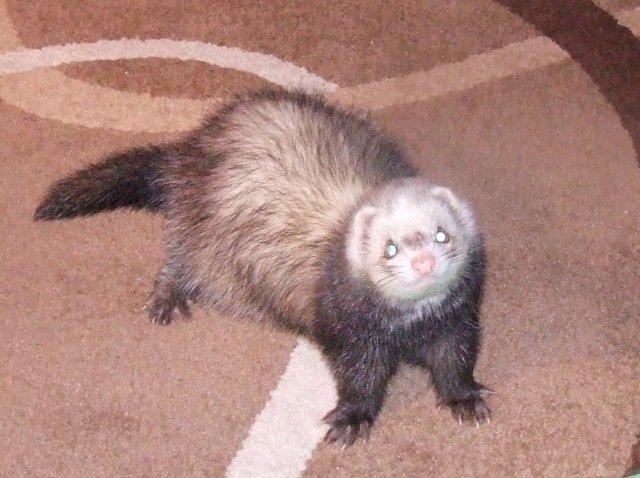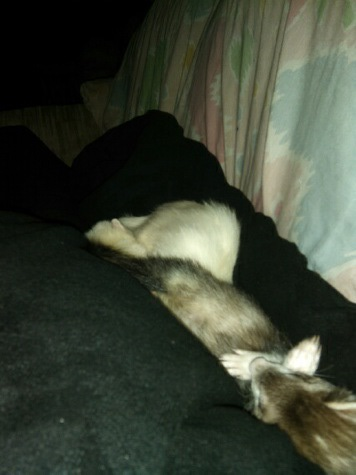QuestionOur 3 year old ferret got his tail crushed by a hand weight. He had it removed surgically almost 2 weeks ago at the Cornell Companion Animal Hospital. He seemed to do well with the surgery, but some time passed between the injury and the surgery. When we first brought him in the vet showed us that he was leaking urine and that he had a very full bladder. They thought he might have nerve damage that was preventing him from urinating. He was and is walking OK and his little anus is puckered, so it looks like some nerves back there are functional, although his poops are little short things rather than the usual long ones. We have been expressing his urine by putting pressure on his bladder (as shown by the vets) and we've been doing that twice a day. The vet has also given us phenoxazine - 5 mg once a day, which we put in baby food. I hold him while my husband does the squeezing. The little guy seems OK when he first starts to urinate but then he struggles a great deal. My husband feels that he gets it about half empty before we need to stop. He seems OK afterwards - scurrying around just fine.
He goes in for a recheck on his surgery in a week and a half. I have talked to the vet on the phone about his bladder. They (don't want to use a personal pronoun) suggested that if he hasn't started urinating on his own by now he probably won't ever do it again and that we will need to do this bladder squeezing for the rest of his life. They also suggested that his quality of life is something that we need to consider.
The vet was also saying that the nerves that go to his bladder could be damaged even though the other nerves seemed to be working OK. They mentioned that the nerves to the bladder were further back on the spine than the nerves for his legs. (Or at least that's what I heard - they may have said something different.)
So I have a couple of related questions. I'm asking you because of your combination of experience with ferrets and possible expertise or access to ferret neuroanatomy. First, does it make sense that his bladder nerves might be damaged but his legs are fine? The vet mentioned that the sphincter was puckered which indicated that the nerve damage did not extend to those muscles. Second, I wonder if part of his problem is that we are irritating his bladder by expressing the urine. Maybe if he had a catheter for a day or two his bladder would get a rest (from the squeezing. That's got to hurt.) Third, if he really is permanently unable to urinate on his own, are we being cruel and selfish by making him go through all of this? We lost a beloved pet in late March so losing him would be even more traumatic.
Thanks.
AnswerHello Susan,
The poor guy! Ferrets are very accident-prone because of their insatiable curiosity. It is wonderful that you are doing all you possibly can to help him. Cornell is one of the best facilities in the United States, so he could not be in better hands.
Most animals and humans have similar neural anatomy. It is possible that the nerves to his bladder have been damaged which is causing the inability to urinate. The pudendal nerve enervates the sphincter of the bladder, which causes urination when relaxed. The pudendal nerve branches off of the sacral plexus farther down from the sciatic (it controls nerve function to the rear legs). This image may help illustrate the location of the pudendal nerve for you and its relation to the sciatic:
http://en.wikipedia.org/wiki/File:Gray828.png
I have found a brief summary of the process of urination from http://www.seekwellness.com/incontinence/how_bladder_works.htm:
"Storage and emptying of the bladder are regulated by the internal and external urethral sphincters. Sphincters are made up of a ring-like band of muscle fibers close off a natural opening in the body. Sphincters are normally in a closed position and need stimulation to open. Continence depends on two factors: normal lower urinary tract support and normal sphincteric function. (The internal sphincter is under involuntary control while the external sphincter is controlled voluntarily).
Lying below the internal sphincter is the external sphincter which is made up of smooth muscle mixed with striated, or striped, muscle of the pelvic floor or pelvic diaphragm. Unlike the smooth muscles that an individual can not consciously control, the striated muscles of the external sphincter allow for voluntary interruption of abdominal pressure to prevent urine leakage, such as occurs in coughing or sneezing.
These three sets of muscles must work in close unison to control the various stages of urinary bladder filling and emptying. During the filling stage, only minimal activity is needed to produce closure of the external urethral sphincter. At a certain point during bladder filling, the internal pressure within the bladder becomes strong enough to activate stretch receptors in the bladder wall. When these stretch receptors send a message to the nervous system, small contractile waves occur in the detrusor muscle and the internal urethral sphincter automatically relaxes and becomes funnel shaped. The external sphincter must now be consciously tightened, and the urge to urinate becomes very apparent. To urinate, a person must relax the external sphincter."
It is true that expressing has bladder on a daily basis can be difficult. Not only is is painful to press of the bladder every time he needs to urinate, but over time it can damage the bladder or create more problems. You may need to catheterize him intermittently to avoid that. It is best to talk to your vet about the long-term options for his care if normal urinary function cannot be restored.
It is true that the quality of life is a major thing to keep in mind. As the owner, you know your animal better than anyone else. If he is happy and leading a normal life besides his urinary problem, his quality of life is still good. You are a responsible, caring owner and you would know if he is suffering. For now, speak with your vet at the recheck and see if anything has changed about your ferret's prognosis and long term treatment options.
Please keep me posted to his progress. I will be hoping that all works out well. If you have any questions, please do not hesitate to contact me.
-Cindy P.

 Piper
QuestionQUESTION: Hi, and thankyou for your quick respo
Piper
QuestionQUESTION: Hi, and thankyou for your quick respo
 Poisonous outdoor plants.
QuestionHi, Cindy. I had a question thats been spinning
Poisonous outdoor plants.
QuestionHi, Cindy. I had a question thats been spinning
 Female Behavior Issues
QuestionQUESTION: I have had Ryoko, my female ferret, f
Female Behavior Issues
QuestionQUESTION: I have had Ryoko, my female ferret, f
 Maggots found in ferret cage?!
Question
Cloud and Bandit
So i have had my femal
Maggots found in ferret cage?!
Question
Cloud and Bandit
So i have had my femal
 Ferret itching a lot
Question
brad-lees hair loss
I have a 4 year old ferret
Ferret itching a lot
Question
brad-lees hair loss
I have a 4 year old ferret